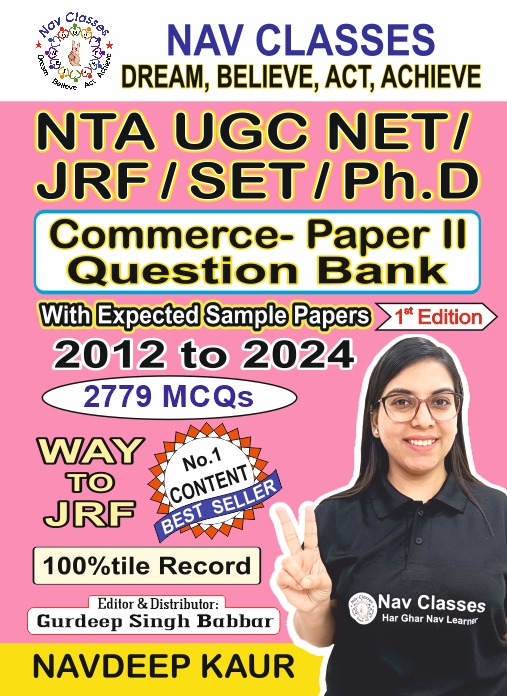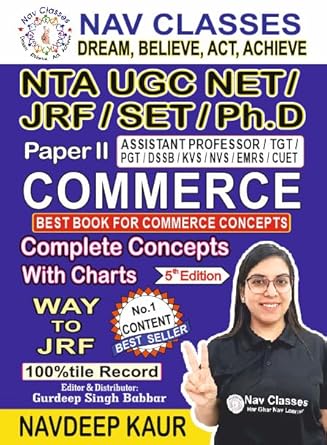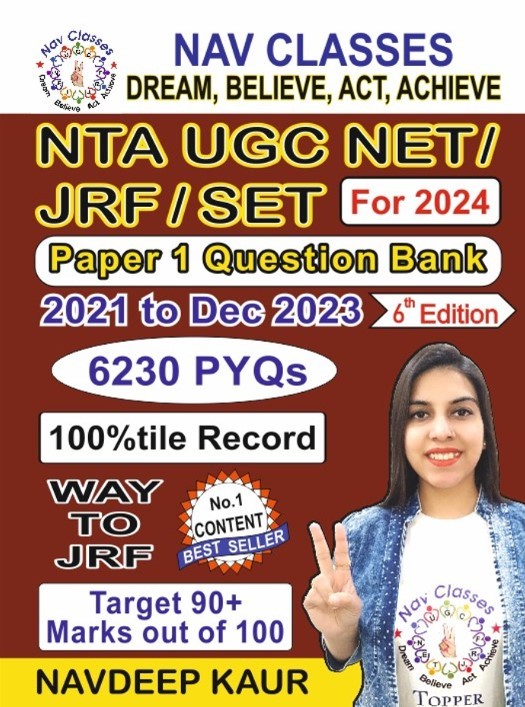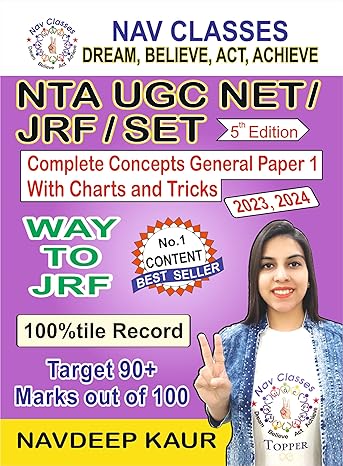1. A teacher uses a question-answer session to ensure desired learning outcomes in his/her classroom. In this process, he/she offers the following type of comment to a few answers given by a student:
Yes, you are right, good.
This will be considered as an example of:
1. Positive feedback.
2. Negative feedback.
3. Confirmatory feedback.
4. Corrective feedback.
एक शिक्षक अपनी कक्षा में वांछित अधिगम परिणामों को सुनिश्चित करने के लिए प्रश्न-उत्तर सत्र का उपयोग करता है। इस प्रक्रिया में, वह एक छात्र द्वारा दिए गए कुछ उत्तरों पर निम्न प्रकार की टिप्पणी प्रस्तुत करता है:
हाँ, तुम सही हो, अच्छा।
इसे एक उदाहरण के रूप में माना जाएगा:
SHOW ANSWER
Explanation: Types of feedback in classrooms:
Negative feedback – corrective comments about past behaviour.
Negative feedback is given when learner’s behaviour was not successful and shouldn’t be repeated.
Positive feedback – affirming comments about past behaviour. -ve feedback is given when learner’s behaviour was successful and should be continued.
Negative feed-forward – corrective comments about which type of actions can be taken to increase future performance.
Positive feed-forward – affirming comments about future behaviour.
©navclasses
2. Given below are two statements.
Statement l: Persuasive communication by a teacher in the classroom is intended to make his/her version of information acceptable to students.
Statement II: If it happens at the institutional level, the purpose behind it is image building.
1. Both Statement I and Statement Il are true.
2. Both Statement I and Statement Il are false.
3. Statement is true but Statement II is false.
4. Statement I is false but Statement Il is true.
नीचे दो कथन दिए गए हैं।
कथन l: कक्षा में एक शिक्षक द्वारा प्रेरक संचार का उद्देश्य छात्रों के लिए जानकारी के अपने संस्करण को स्वीकार्य बनाना है।
कथन II: यदि यह संस्थागत स्तर पर होता है, तो इसके पीछे का उद्देश्य छवि निर्माण है।
SHOW ANSWER
Explanation: At an institutional level like an organisation or university, it is to increase reputation or build the image of that institute. ©navclasses
3. Given below are two statements.
Statement I: Different communities exist independent of one another but jointly somehow they give an idea of communitarian life of a society.
Statement II: Earth exists either through a blind chance or through an inner necessity or through an external cause.
In light of the above statements, choose the most appropriate answer from the options given below:
1. Both Statement I and Statement Il are true.
2. Both Statement and Statement il are false.
3. Statement is true but Statement II is false.
4. Statement I is false but Statement Il is true.
नीचे दो कथन दिए गए हैं।
कथन I: विभिन्न समुदाय एक दूसरे से स्वतंत्र होते हैं लेकिन संयुक्त रूप से किसी तरह वे समाज के सामुदायिक जीवन का एक विचार देते हैं।
कथन II: पृथ्वी का अस्तित्व या तो एक अंधे अवसर से या किसी आंतरिक आवश्यकता के माध्यम से या किसी बाहरी कारण से है।
उपरोक्त कथनों के आलोक में, नीचे दिए गए विकल्पों में से सबसे उपयुक्त उत्तर का चयन करें:
SHOW ANSWER
Explanation: As per Kant, there is disjunctive relation – ‘Earth exists either through a blind chance, or through an inner necessity, or through an external cause’. ©navclasses
4. Given below are two statements.
Statement I: When I look deep into myself, I always stumble with one perception or another. I can never catch myself
Statement II: Self is the logical presupposition of all knowledge. Therefore, concepts like substance and person can not be applied to it.
1. Both Statement and Statement Il are true.
2. Both Statement I and Statement Il are false.
3. Statement is true but Statement II is false.
4. Statement is false but Statement Il is true.
नीचे दो कथन दिए गए हैं।
कथन I: जब मैं अपने आप में गहराई से देखता हूं, तो मैं हमेशा एक धारणा या किसी अन्य से ठोकर खाता हूं। मैं खुद को कभी नहीं पकड़ सकता
कथन II: स्वयं सभी ज्ञान का तार्किक पूर्वधारणा है। इसलिए, पदार्थ और व्यक्ति जैसी अवधारणाओं को उस पर लागू नहीं किया जा सकता है।
SHOW ANSWER
Explanation: Main goal of many ancient philosophers was to understand the self, when one tries to know the self and perceive it differently every time.
©navclasses
5. Assertion A: Human touch in communication enables students to become participatory.
Reason R: In a technology-driven classroom environment, the communicative role of a teacher is secondary.
1. Both A and R are true and R is the correct explanation of A.
2. Both A and Rare true but R is NOT the correct explanation of A.
3. A is true but R is false.
4. A is false but R is true.
अभिकथन A: संचार में मानवीय स्पर्श छात्रों को सहभागी बनने में सक्षम बनाता है।
कारण आर: प्रौद्योगिकी संचालित कक्षा के माहौल में, शिक्षक की संचार भूमिका माध्यमिक होती है।
SHOW ANSWER
Explanation: Human touch means personalised communication as per participants. The teacher role will always be primary not secondary as one can not fully rely on a technological classroom. ©navclasses
6. The difference of the square of two consecutive even numbers is 84. What is the sum of these two consecutive even numbers?
1.34
2. 38
3.36
4.42
दो क्रमागत सम संख्याओं के वर्ग का अंतर 84 है। इन दो क्रमागत सम संख्याओं का योग क्या है?
SHOW ANSWER
Explanation: (x + 2)^2 – x^2 = 84
4x + 4 = 84
4x = 80; x = 20.
∴ The required sum
= x + (x + 2) = 2x + 2 = 42
©navclasses
7. Identify the next term in the series:
0, 8, 24, 48, _.
1. 72
2. 96
3. 120
4. 80
SHOW ANSWER
Explanation: 3²-1 = 8; 5²-1 = 24; 7²-1 = 48; 9² -1 =80
Or (0×2)(2×4)(4×6)(6×8)(8×10)
©navclasses
8. A man is 30 years older than his son. Five years ago, his age was 6 times the age of his son. The age of the son is:
1. 10 years
2. 11 years
3. 12 years
4. 15 years
एक आदमी अपने बेटे से 30 साल बड़ा है। पाँच वर्ष पूर्व उसकी आयु उसके पुत्र की आयु की 6 गुनी थी। बेटे की उम्र है:
SHOW ANSWER
Explanation: (30 + x) – 5 = 6 (x -5)
25 + x= 6x – 30
5x= 55; x= 11
©navclasses
9. A motorist travels to a place 150km away at an average speed of 50km/hour and returns at a speed of 30km/hour. His average speed for the whole journey is:
1.35 km/hour
2. 37.5 km/hour
3. 40 km/hour
4.42.5 km/hour
एक मोटर यात्री 150 किमी दूर एक स्थान की यात्रा 50 किमी/घंटा की औसत गति से करता है और 30 किमी/घंटा की गति से लौटता है। पूरी यात्रा के लिए उसकी औसत गति है:
SHOW ANSWER
Explanation: avg speed=2xy/x+y
2×50×30/50+30
3000/80= 300/8= 150/4= 75/2= 37.5kmph
©navclasses
10. What is the next term in the following series?
4, 12, 28, 52,?
1. 76
2. 84
3. 98
4. 104
SHOW ANSWER
Explanation: 1² + 3 = 4; 3² + 3 = 12; 5² + 3 = 28
7² + 3 = 52; 9² + 3 = 84
©navclasses







21 responses
Thank you mem for this quiz provided you with answers.
This is most helpful for me..
Thank you mem
10/10
Thanku mam
#navlearner #dbaa
10/10 thanx fr the quiz!!!! #navlearner #dbaa
10 /10 marks mam quiz bhut acha tha….thanku so much ????
#navclasses #navlearner #jrfismine
Thank you mam
10/10
Navlearner####jrf is mine
Dream believe act achieve?
Its wonderful….Thank you mam.
8/10 … today’s score.. 26.06.21
9/10
10/10. Thank you mam. Ye sb aapke liye hi possible ho rha h.
#navlearner#dbaa#jrfismine2021#navdeepmam
8/10
10 marks
9/10, thank you so much mam….. #navlearner #DBAA #jrfismine2021 ✌?✌?
Mam apki ye website Kafi bacho ko help kregi good job man . #jrfismine #navclasses
10/10… Thnk u ma’am?????
10/10
10/10 thank you so much mam and live you
8/10 Thanku mam …. for all this
i take quiz everyday mam…..
Mam I got 8/10 I need improvement ?thankyou mam
8/10….THANKYOU MAAM…AB sare MR questions k solution mil jate or easily smjh bhi aajate…..
Thanku sooo much mam ❤️❤️ for ur effort ?#navclasses#navlearner#jrfismine?god bless you ❤️❤️❤️
Got 9/10
#navlerarnersrocks#dbaa#jrfismine✌️✌️✌️